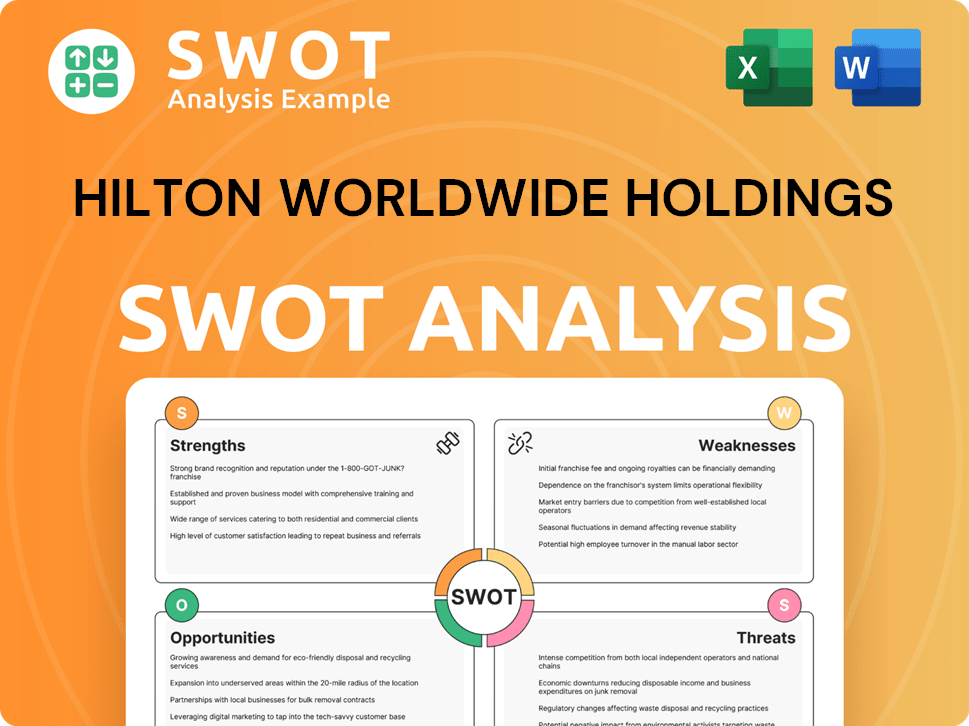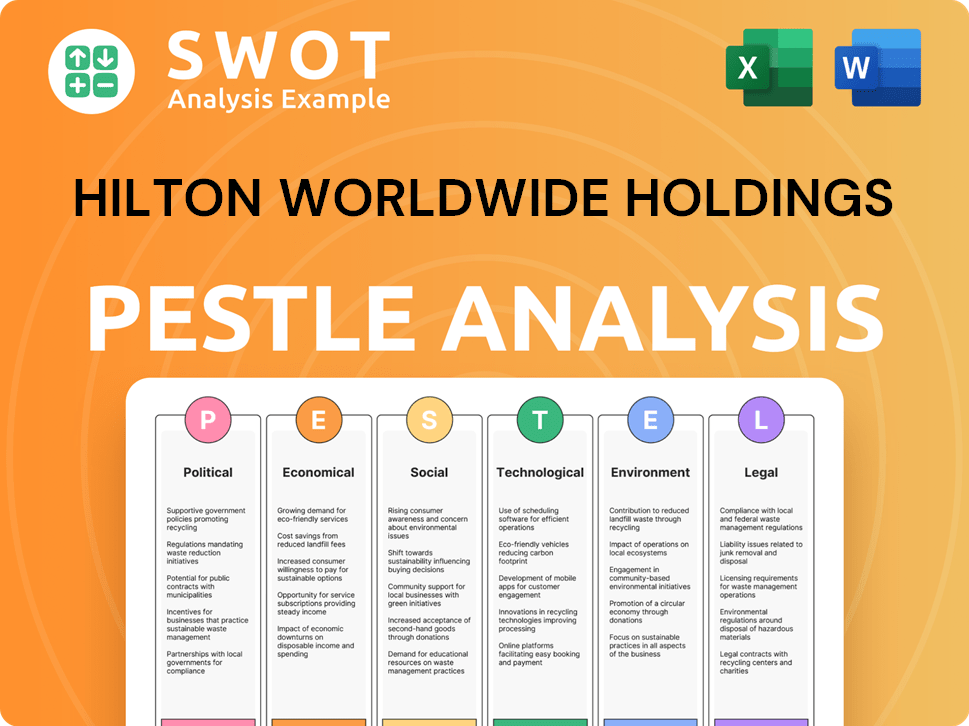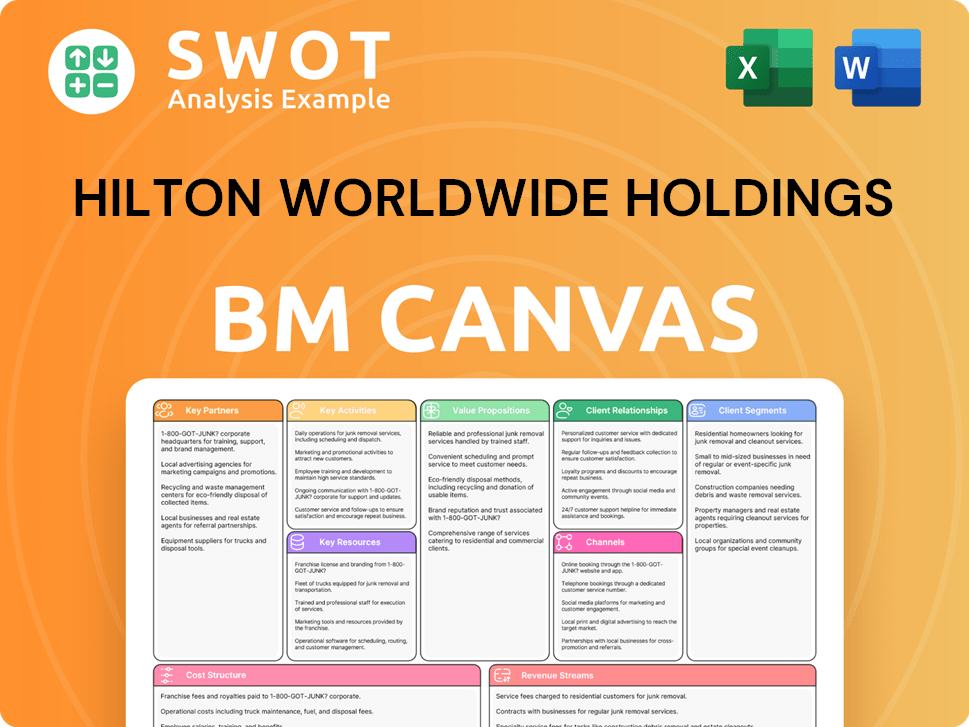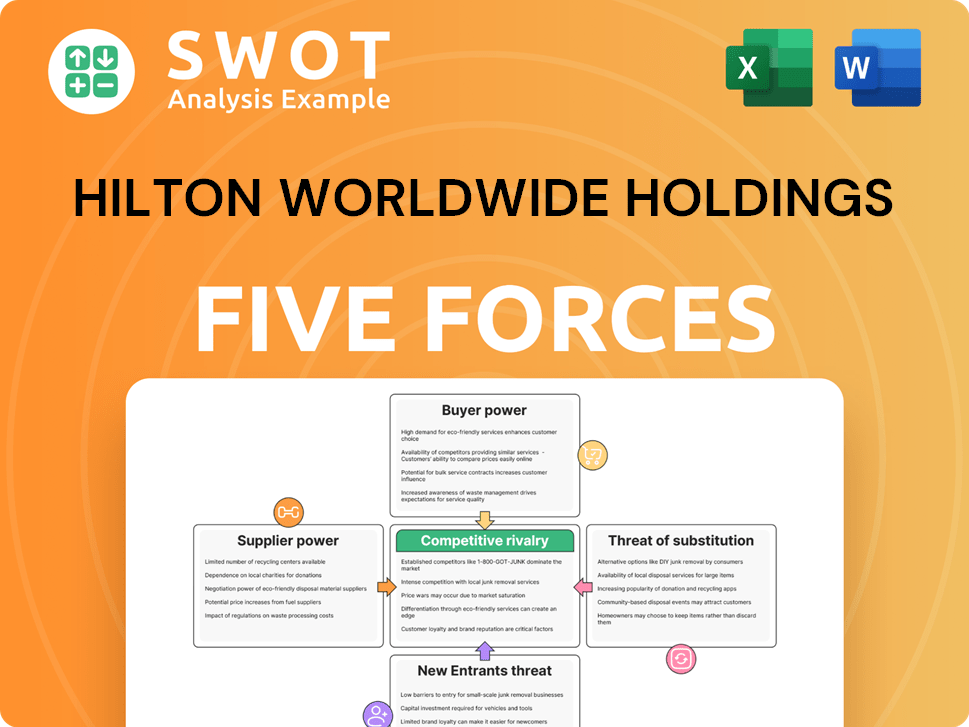Hilton Worldwide Holdings Bundle
How Does Hilton Worldwide Thrive in the Global Hospitality Arena?
Hilton Worldwide Holdings Inc., a titan in the global hospitality industry, boasts an impressive portfolio of hotels and resorts, continually redefining the travel experience. With a robust pipeline of new hotels, as reported in early 2024, Hilton Company is poised for continued expansion and market dominance. Understanding the inner workings of this hospitality giant is key to unlocking its potential.

This deep dive into Hilton Worldwide will explore its multifaceted business model, encompassing ownership, management, and franchising, to reveal how it navigates the competitive landscape. We'll examine its diverse revenue streams and strategic initiatives, offering valuable insights for investors, industry professionals, and anyone interested in the Hilton Worldwide Holdings SWOT Analysis. Learn about the Hilton Holdings company structure, its approach to hotel management, and how this hotel chain has become a global leader in the hospitality industry.
What Are the Key Operations Driving Hilton Worldwide Holdings’s Success?
Hilton Worldwide Holdings Inc., or Hilton Company, delivers value through its extensive network of hotel brands, catering to a wide range of customer needs. The company focuses on providing exceptional lodging experiences, including guest rooms, meeting facilities, dining options, and recreational amenities. Their services extend to individual travelers, business clients, groups, and event organizers globally.
Hilton Holdings operates primarily through management and franchise segments. In the management segment, Hilton directly operates hotels on behalf of third-party owners, utilizing its brand recognition and operational expertise. The franchise segment involves licensing brand names and operational systems to independent hotel owners. This asset-light strategy enables rapid expansion with reduced capital expenditure. The company also maintains an ownership segment, though it is a smaller part of its overall operations.
Hilton Worldwide's supply chain sources various goods and services, from food and beverages to technology, for its managed and owned properties. It also provides preferred vendor lists for its franchisees. Partnerships with travel agencies, online travel agencies (OTAs), and corporate clients are essential for its distribution networks, ensuring broad market reach. The company differentiates itself through its strong brand equity across its diverse portfolio and the Hilton Honors loyalty program, which had over 180 million members as of Q1 2024, fostering customer loyalty and driving repeat business.
Hilton offers a wide array of lodging options, from luxury to focused-service hotels. These include guest rooms, suites, meeting facilities, dining, and recreational amenities. They cater to diverse customer segments, including individual travelers, business clients, and event organizers.
Hilton primarily operates through management and franchise segments. In the management segment, Hilton directly operates hotels. The franchise segment licenses brand names and systems to independent owners. This approach allows for rapid expansion with less capital investment.
Hilton relies on partnerships with travel agencies, OTAs, and corporate clients for distribution. These partnerships ensure broad market reach. The company also maintains a robust supply chain for its managed and owned properties, providing preferred vendor lists for franchisees.
Hilton differentiates itself through strong brand equity and the Hilton Honors loyalty program. The program, with over 180 million members as of Q1 2024, offers exclusive perks and points, fostering customer loyalty. This drives repeat business and enhances customer satisfaction.
Hilton's business model focuses on providing exceptional lodging experiences and expanding its global presence through a mix of managed and franchised hotels. The Hilton Honors program is a key differentiator, driving customer loyalty and repeat business. The company's revenue streams are diversified across its various hotel brands and operational segments.
- Diverse Brand Portfolio: Offers a wide range of brands to cater to different market segments.
- Asset-Light Strategy: Employs a franchise model for rapid expansion with reduced capital requirements.
- Global Presence: Operates in numerous countries, providing a strong global footprint.
- Loyalty Program: Hilton Honors drives customer loyalty and repeat business.
Hilton Worldwide Holdings SWOT Analysis
- Complete SWOT Breakdown
- Fully Customizable
- Editable in Excel & Word
- Professional Formatting
- Investor-Ready Format

How Does Hilton Worldwide Holdings Make Money?
Understanding the revenue streams and monetization strategies of Hilton Worldwide Holdings Inc. (Hilton Holdings) is crucial for investors and stakeholders. The company, a major player in the hospitality industry, employs a multifaceted approach to generate income and maximize profitability. This involves a blend of franchise fees, management fees, and revenue from owned and leased hotels.
Hilton's business model emphasizes an asset-light strategy, focusing on brand management and franchising. This approach allows the company to expand its global footprint while minimizing capital expenditures. The company's financial performance, particularly in its fee-based segments, reflects the success of this strategy.
In the first quarter of 2024, Hilton's management and franchise fees were the largest contributor to its revenue. Franchise fees reached $758 million, and base and incentive management fees totaled $181 million. This highlights the importance of its franchise network and management agreements. Revenue from owned and leased hotels, while significant, was a smaller portion at $367 million in Q1 2024.
Hilton employs several monetization strategies to boost revenue and customer loyalty. These strategies include tiered pricing, the Hilton Honors loyalty program, and dynamic pricing.
- Tiered Pricing: Hilton utilizes tiered pricing across its brand portfolio, which includes luxury brands like Waldorf Astoria and Conrad, as well as mid-scale options like Hampton by Hilton and Hilton Garden Inn. This caters to diverse market segments and price points.
- Hilton Honors: The Hilton Honors loyalty program is a key driver of direct bookings and repeat business. It reduces reliance on third-party channels, improving profitability. The program also facilitates cross-selling of services and amenities.
- Dynamic Pricing: Hilton uses dynamic pricing strategies, adjusting room rates based on demand, seasonality, and market conditions. This optimization helps maximize revenue per available room (RevPAR).
- Strategic Shift: Over time, Hilton has increasingly focused on its management and franchise segments, which offer higher margins and require less capital compared to direct hotel ownership. This strategic shift reflects a move towards a more fee-based model. For more information about the company, you can read Owners & Shareholders of Hilton Worldwide Holdings.
Hilton Worldwide Holdings PESTLE Analysis
- Covers All 6 PESTLE Categories
- No Research Needed – Save Hours of Work
- Built by Experts, Trusted by Consultants
- Instant Download, Ready to Use
- 100% Editable, Fully Customizable

Which Strategic Decisions Have Shaped Hilton Worldwide Holdings’s Business Model?
The evolution of Hilton Worldwide Holdings has been marked by significant milestones, strategic initiatives, and a focus on maintaining a competitive edge within the hospitality industry. The company's journey includes pivotal moments that have shaped its operational structure and financial outcomes. These key developments underscore the company's adaptability and its commitment to long-term growth within a dynamic market.
A central strategic move for the Hilton Company has been its emphasis on global expansion through an asset-light model. This approach, which prioritizes management and franchising, allows for rapid growth with reduced capital investment. As of Q1 2024, the robust pipeline of 3,370 hotels, representing approximately 479,400 rooms, highlights the effectiveness of this strategy. Furthermore, the introduction of new brands, such as Tempo by Hilton and Spark by Hilton, demonstrates the company's ability to adapt to changing consumer preferences and market opportunities.
The hospitality industry, including Hilton Holdings, faced significant challenges, particularly during the global pandemic. The company responded by prioritizing guest and team member safety, implementing enhanced cleaning protocols, and adjusting its operational models to navigate reduced travel demand. Cost containment and effective liquidity management were also critical during this period, ensuring the company's stability and resilience.
Hilton Worldwide has achieved several milestones, including its initial public offering (IPO) and strategic acquisitions that have expanded its brand portfolio. These events have been instrumental in shaping its market position and operational capabilities. The company's evolution reflects its ability to adapt and innovate within the dynamic hospitality sector.
The company's strategic moves include a focus on global expansion through franchising and management agreements. This asset-light model allows for rapid growth and reduced capital expenditure. The introduction of new brands and the enhancement of the Hilton Honors loyalty program are also key strategic initiatives.
Hilton Company's competitive advantages include its strong brand portfolio, technology leadership, and the Hilton Honors loyalty program. The company's global presence and operational efficiencies also contribute to its competitive edge. These factors enable the company to maintain its position in the competitive hospitality industry.
Hilton Worldwide's financial performance is driven by its global presence, brand strength, and operational efficiency. The company's revenue streams include management and franchise fees, as well as revenues from owned and leased properties. Key financial metrics, such as RevPAR (Revenue Per Available Room) and occupancy rates, are closely monitored to assess performance.
Hilton's competitive advantages are multifaceted, including brand strength, technology leadership, and the Hilton Honors loyalty program. The company's global presence and operational efficiencies also contribute to its strong market position. These factors enable Hilton Holdings to maintain a leading position in the dynamic hospitality landscape.
- Brand Strength: A portfolio of globally recognized brands that resonate with travelers.
- Technology Leadership: Digital booking platforms and the Hilton Honors loyalty program.
- Hilton Honors: Over 180 million members as of Q1 2024, driving direct bookings.
- Operational Efficiencies: Economies of scale in procurement, marketing, and operations.
Hilton Worldwide Holdings Business Model Canvas
- Complete 9-Block Business Model Canvas
- Effortlessly Communicate Your Business Strategy
- Investor-Ready BMC Format
- 100% Editable and Customizable
- Clear and Structured Layout

How Is Hilton Worldwide Holdings Positioning Itself for Continued Success?
The position of Hilton Worldwide Holdings Inc. within the global hospitality industry is notably strong. As one of the largest and most recognized hotel companies, its market share is significant. This is driven by an extensive portfolio of brands and a broad global presence across 126 countries and territories as of Q1 2024. The strength of the Hilton Honors loyalty program, which boasts over 180 million members, plays a crucial role in customer loyalty within the competitive lodging sector.
Despite its strong standing, Hilton faces several risks. Economic downturns, geopolitical instability, and health crises can significantly impact travel demand, affecting hotel occupancy and revenue. Regulatory changes and the emergence of new competitors, including alternative accommodation providers, also pose challenges. Adapting to evolving consumer preferences, like the demand for sustainable travel, is another ongoing necessity.
Hilton Worldwide is a leading hotel chain, recognized globally. It operates across 126 countries, with a vast portfolio of brands. The company benefits from a strong customer loyalty program, Hilton Honors, with over 180 million members.
Economic downturns and geopolitical instability can negatively affect travel demand. Regulatory changes and competition from alternative accommodations pose threats. Evolving consumer preferences require constant adaptation and investment.
Hilton plans continued global expansion, especially in international markets. The company is investing in technology and focusing on responsible tourism. Brand diversification and leveraging the Hilton Honors program are key strategies.
Hilton aims to expand its asset-light business model and customer loyalty. Strategic expansion into high-growth markets is a priority. Adapting to industry trends and mitigating risks are also important.
Hilton's future is guided by strategic initiatives aimed at sustained growth. The company is focused on expanding its global pipeline, with a strong emphasis on international markets. Investments in technology are being made to enhance guest experiences and improve operational efficiency. Leadership is committed to responsible tourism, digital transformation, and brand diversification. Hilton plans to leverage its strong brand equity, optimize its asset-light model, and expand into high-growth markets. To understand the competitive environment, consider the Competitors Landscape of Hilton Worldwide Holdings.
Hilton's growth strategy includes global expansion and technological innovation. The company is also focused on enhancing customer loyalty and adapting to market changes.
- Expanding its global footprint, particularly in high-growth regions.
- Investing in technology to improve guest experiences and operational efficiency.
- Strengthening the Hilton Honors loyalty program.
- Focusing on sustainable and responsible tourism practices.
Hilton Worldwide Holdings Porter's Five Forces Analysis
- Covers All 5 Competitive Forces in Detail
- Structured for Consultants, Students, and Founders
- 100% Editable in Microsoft Word & Excel
- Instant Digital Download – Use Immediately
- Compatible with Mac & PC – Fully Unlocked

Related Blogs
- What are Mission Vision & Core Values of Hilton Worldwide Holdings Company?
- What is Competitive Landscape of Hilton Worldwide Holdings Company?
- What is Growth Strategy and Future Prospects of Hilton Worldwide Holdings Company?
- What is Sales and Marketing Strategy of Hilton Worldwide Holdings Company?
- What is Brief History of Hilton Worldwide Holdings Company?
- Who Owns Hilton Worldwide Holdings Company?
- What is Customer Demographics and Target Market of Hilton Worldwide Holdings Company?
Disclaimer
All information, articles, and product details provided on this website are for general informational and educational purposes only. We do not claim any ownership over, nor do we intend to infringe upon, any trademarks, copyrights, logos, brand names, or other intellectual property mentioned or depicted on this site. Such intellectual property remains the property of its respective owners, and any references here are made solely for identification or informational purposes, without implying any affiliation, endorsement, or partnership.
We make no representations or warranties, express or implied, regarding the accuracy, completeness, or suitability of any content or products presented. Nothing on this website should be construed as legal, tax, investment, financial, medical, or other professional advice. In addition, no part of this site—including articles or product references—constitutes a solicitation, recommendation, endorsement, advertisement, or offer to buy or sell any securities, franchises, or other financial instruments, particularly in jurisdictions where such activity would be unlawful.
All content is of a general nature and may not address the specific circumstances of any individual or entity. It is not a substitute for professional advice or services. Any actions you take based on the information provided here are strictly at your own risk. You accept full responsibility for any decisions or outcomes arising from your use of this website and agree to release us from any liability in connection with your use of, or reliance upon, the content or products found herein.